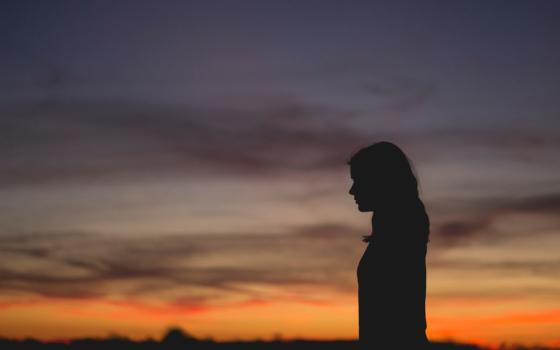It was midday when I arrived at Sharon's house, glad for some respite from the Belizean sun. I found the whole family crowded into the tiny space that doubled as living room and kitchen, eating johnnycakes and fried chicken. I usually stopped to visit on the way home from work, preferring to stand at the stairs for a chat instead of wedging my way into the two-room house crowded with some combination of Sharon, her four adult children, three grandchildren and usually a handful of visitors.
But today it was dinnertime, and I was invited inside, plunked down in the only free chair, and given food and juice. As I ate and watched the Indian soap opera on TV, I remarked more to myself than to anyone else, "Well, I really feel like one of the family now!"
My friend looked up at me from behind her sewing machine and said with a small smile and no fanfare, "Chris, you were a long time ago."
She went back to her sewing, not looking for a response. This was a good thing because although she didn't know it, she'd knocked the power of speech right out of me.
I wasn't the first well-meaning volunteer to walk through Sharon's door. She knew the drill: I'd spend my two years soaking in the culture and marveling at the relationships of the tight-knit community, only to return to the United States like all the others. She and her family would remain to share cramped midday meals in the tiny house. She would've been perfectly justified in wanting nothing to do with me, or at the very least, holding me at arm's length.
But she didn't. Like so many of my neighbors, Sharon extended a kind of no-strings-attached welcome that, until that point in my life, I had rarely experienced. I was welcomed into their web of belonging in ways that were unassuming and commonplace: invitations to converse on porches, meals shared, cups of sugar borrowed, jokes shouted over fences or through open windows. Over and over, I marveled at the sense of community that was so evident, so real, so natural.
At the end of two years, I did return to the U.S. I returned, in fact, to a comfortable Midwestern suburb where crossing the mowed lawn to borrow a muffin tin from a neighbor felt like a monumental feat … or an act of resistance. Soon I was knocking on the door of a convent, my own long-percolating vocation hastened by a longing for community. One year later, I became a candidate.
There's no doubt I came to religious life longing for something akin to what I experienced in Belize. I came seeking a way of life that stood in prophetic contrast to the individualism so prized in the society in which I was raised.
And I'm not alone. My vocation is, of course, a response to God's invitation; but like many new members of religious communities, a longing for belonging has been part of my discernment. We long to be part of, to create, and to extend something we recognize that far too many in our world lack — authentic community.
John O'Donohue writes, "To be human is to belong. Belonging is a circle that embraces everything; if we reject it, we damage our nature." From polarized partisan politics (which claim that I only belong to those on my side of the aisle) to environmental rollbacks (which altogether deny our belonging to the community of Earth), it seems we continually find more ways to narrow our circle of belonging. Perhaps that's why we find ourselves waking each day to news of mass shootings and imminent environmental collapse.
The necessity of belonging seems to be as much a scientific as it is a theological or ideological truth. Psychologists and neuroscientists tell us that we're hardwired for interdependence and community. John Cacioppo, who studied loneliness for over 20 years, said that just as hunger tells us that a basic need isn't being met, loneliness indicates a lack of meaningful social connection. Loneliness is a warning sign meant to save us from harm.
But we haven't been listening. According a recent survey, nearly half of U.S. adults view themselves as lonely. The numbers are even higher among young people. Cacioppo explains: "We think we're supposed to become independent—the king of the mountain. But in social mammals—not just humans—becoming an adult means being the individual upon whom others can depend. Our Western cultural notion of human nature does not capture our actual social nature particularly well."
No wonder Dorothy Day titled her autobiography The Long Loneliness. No wonder Mother Teresa, after a visit to England, remarked, "I have walked at night and gone into your homes and found people dying unloved. Here [in the West] you have a different kind of poverty — a poverty of the spirit, of loneliness, and of being unwanted. And that is the worst disease in the world today, not tuberculosis or leprosy."
Consumerism tells us we can fill the loneliness with stuff, screens or being busy. Individualism tells us that needing others is a weakness. Those of us who live in a culture saturated with these values — even in religious life — aren't immune to their effects. Discerning where these temptations lie both personally and communally is part of our call to community.
We know that living in what we may call a community doesn't mean that we've actually created one. It takes work. Intentional, unexciting, daily work. But it's essential, absolutely critical, in our times.
Teresa Maya said as much in her recent LCWR presidential address: "Our mission as leaders for this time is as simple as it is ancient: community… There is nothing more important, more radical, more necessary for us than to lean into our apostolic call to nurture and foster community."
This is our gift to the world. With the holiday season almost upon us, can we resolve to give it more generously than ever?
[Christin Tomy is a Dominican Sister of Sinsinawa, Wisconsin. While living and working in Central and South America, she discovered a passion for ecological work, and she currently ministers as care for creation coordinator at Sinsinawa Mound.]

